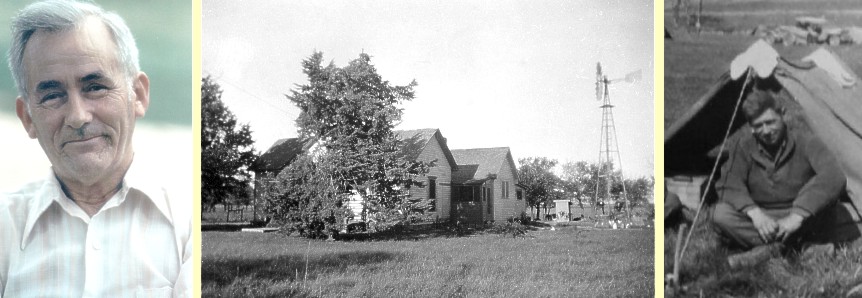Kansas Snapshots by Gloria Freeland - March 20, 2015
Just out of reach
Before going to bed one night last week, husband Art and I watched what might be called a "filler" show - a
short segment used to fill the time between normally-scheduled Public Broadcasting System programs and local
fund-raising efforts. The scenes and sounds were those of country life. Birds sang, crickets chirped, a summer
storm brought thunder and torrential rain over a farmstead with a bright-red barn and white farmhouse. After,
there were sun-lit images of fields filled with ripening crops.
I only half paid attention as they were all scenes I had witnessed many times on the Marion County farm where I
had grown up. Yet somehow it must have entered my subconscious because that night I dreamed of my home. It had
been purchased by my great-grandparents William and Mary Freeland in 1905. In the dream, Dad was explaining that
the east side of the house had once included a formal parlor.
When Dad retired from farming, he rented the land to a neighbor. Then, in 2000, he and Mom moved to Manhattan.
He didn't want to leave the farm, but various health issues gave them no option. And so, the farmhouse was
rented as well.
Although Dad died more than 12 years ago, a day doesn't go by when I don't think of him. Still, it was
disconcerting to have such a vivid dream where I could see and hear and almost touch him. My brother,
sister and I still own the farm, yet it is now nearly 15 years since any family member has lived there.
I consider myself to be a positive person - one who normally looks on the bright side of life. But the dream
put me in a melancholy mood I couldn't readily explain.
And there was more to come. Uncle Stan and Aunt Kay called the next night. I always enjoy conversations with
them. But the news that one of their best friends was in a coma and not expected to live long saddened me. Only a
couple of months ago, one of Stan's buddies from his World War II unit died. I met both these men and it made me
sad that I won't have the chance to visit with them again.
Another event also fed into my bittersweet frame of mind. The day after Stan and Kay's call, Art and I traveled
to the Eisenhower Presidential Library in Abilene. We had gone to research his Uncle Rollie's World War II
experience with the 44th Combat Engineers Battalion. Art said Rollie never spoke much about his time in the service,
so Art had assumed his engineering duties had been behind the lines and well out of harm's way.
But after Rollie's passing, Art's cousin Claudia mentioned that their uncle had been hidden by a family during
the Battle of the Bulge when he had found himself behind enemy lines. We were able to establish that his company
was northwest of Wiltz, Luxembourg when they were surprised by a large German force emerging from the nearby woods.
A U.S. Army account described what happened:
By nightfall, the American perimeter had been pierced at many points and the defenders pushed back into the
center of Wiltz. Most of the tanks and assault guns were out of action, there were insufficient machine guns to
cover the final protective line, radio communication between the desperate units was practically nonexistent,
searchlight rays glancing from the low clouds, lighted the path of the attackers, and ammunition was running very
low...
Colonel Strickler decided to evacuate Wiltz ... but with the Germans pressing in from all sides ... the actual
withdrawal would be difficult to control ...
To the men who could be reached, the orders were that they were on their own and to try as best they could to
work their way to friendly forces farther west.
Claudia said she believed there had been communications later in the war or after the war between their
grandfather and aunt and the family that had protected Rollie. But that was all that was known.
Art thinks it was probably in or near Wiltz that the family sheltered Rollie until he could be reunited with
his unit. He would like to find someone there who might remember the story of the American boy, but knows that is
unlikely to happen this many years later.
After scanning nearly 70 documents, we walked to the nearby museum, whose current exhibition is a timeline of
World War II, complete with photos, letters and artifacts from the different theaters of the war. We've done
substantial research and have visited some of the sites where battles took place, so we're somewhat familiar with
the "story." Still, it�s a story that always affects me when I see the scope of the endeavor and think about how
many people died.
We had barely arrived back home before it was time to head into town to see a performance by the Chieftains.
Although the Irish group played plenty of lively tunes, I've always found them and the slower more haunting
melodies to have an element of sadness in them that served to add to my melancholy.
The next day, I was largely my old self. Part of the day was spent in individual meetings with my journalism
students. With Spring Break right around the corner, some told me they were heading to Florida for the week. A
couple were going to Colorado. A few said they were going home to their family farms to help their parents.
"Oh, that sounds nice," I told them.
Still, part of my feeling from the previous day remained with me. It was a feeling that our todays are
intimately linked to our yesterdays. Yet despite that past being so near, it remains in the shadows just out of
reach.
